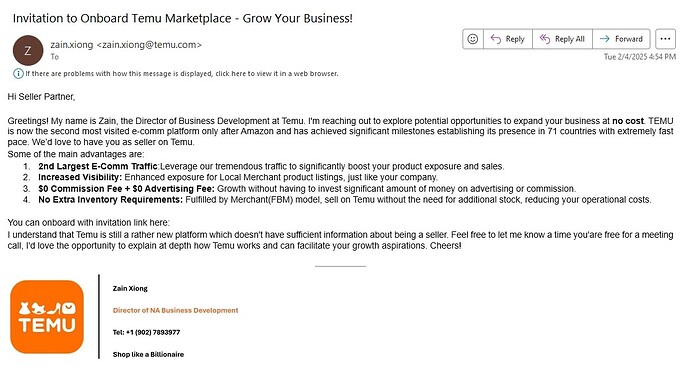By John Herrman, a tech columnist at Intelligencer
02/04/25
The Temu proposition is pretty simple: It’s an app where you can buy stuff that’s mostly made in and often shipped from China. Some of this stuff is entertaining, novel, or weird. Some of it is junk. A lot of it is just regular stuff you can buy elsewhere, including through American retailers like Amazon, but cheaper. Maybe it takes a while to show up, and maybe it’s not quite what you hoped for when you ordered it, but that’s part of a straightforward deal for Temu’s users, who have spent billions of dollars — and growing — on the platform, and for the thousands of mostly Chinese merchants who sell there.
What makes this arrangement possible — in addition to utterly opaque labor practices and a disregard for environmental externalities — are a few strange and specific conditions. One is heavily subsidized shipping: for years, international postal treaties effectively required the United States to subsidize small packages shipped from many countries, including China, creating a situation where it was sometimes cheaper to send a small parcel to North Carolina from Shanghai than from Virginia. This is no longer the case, due in part to a threat to leave the Universal Postal Union by the last DT administration, but shipping from China to the US is still relatively cheap, although companies like Temu, in a rush to get new customers, have sometimes subsidized shipping costs for sellers.
Another thing that makes a business like this viable, or at least theoretically viable, is something called the de minimis tariff exemption, which allows some packages valued under $800 to bypass scrutiny by U.S. Customs and Border Protection and ship to the US tariff-free. Now, after a weekend executive order from President DT, that condition is changing, too:
President Donald DT’s new trade levies against China, Canada and Mexico include a broadside against e-commerce, with apparent plans to extinguish a long-held tariff exemption for packages worth less than $800.
DT’s executive orders directing 25% levies on Canada and Mexico — plus a 10% duty on China — specify that the “de minimis” exemption for small packages no longer applies. Under the exemption, products below that dollar amount are able to enter the US without tariffs — a boon for China’s e-commerce retailers who ship often cheaper wares directly to consumers in the US.
There are some caveats here: This change comes via a brand-new executive order, which government agencies and businesses alike are still figuring out how to interpret and implement; already, the above-mentioned tariffs on imports from Mexico and Canada have been “paused” by the administration. But closing the de minimis loophole was a political priority for the last administration, too, which had started a rulemaking process near the end of Bden’s term. (Both the Bden and DT administrations cited e-commerce competition with China and the drug trade as reasons for changing it; the DT administration has emphasized the latter.)
The fact that the end of the de minimis exception didn’t come out of left field, however, doesn’t make it less of a big deal: For companies like Temu and Shein — as well as popular, older, but lesser-known platforms like AliExpress, not to mention countless Chinese sellers on eBay and Etsy, it could raise costs and increase administrative burdens. Over the past year, Temu has been trying to get more sellers to shift inventory to American logistics firms or, in some cases, spare rooms in American homes; Shein has been doing something similar. This means faster shipping but also higher costs; in addition, existing and new tariffs on Chinese imports will apply to products sold this way.
This sounds like great news for Amazon, which has been worried about and reacting to Shein and Temu for years, and in some ways it is — the company’s fastest-growing competitors are losing an advantage, and being forced to compete on Amazon’s turf. In its efforts to take on foreign retailers, however, Amazon, has become a lot more like Shein and Temu. It has moved downmarket and recently launched a direct competitor to Temu, a section called Haul, where Amazon customers can shop direct-from-China discount products. (So far it’s a dud.)
How the retailers handle this relative to one another is currently up in the air. At the moment, the change is still passing through the standard DTian “chaos at all levels” phase of implementation, in which nobody really knows what’s real or what to do about it.
At least as unclear is what customers of Temu and Shein — who together make up a sizable portion of the adult American public — will make of the change. In the abstract, closing a trade loophole that gave Chinese firms a major advantage over American ones and may have aided the international drug trade is a fairly easy argument to make. So is an argument that these sites encourage the production of semi-disposable goods destined for landfills. In practice, Shein and Temu are broadly popular, with tens of billions of dollars in yearly sales and a customer base that cuts across economic and political lines. A recent working paper from the National Bureau of Economic Research draws on data about Shein and Temu users to figure out what eliminating the de minimis exemption might actually mean for them, as well as who they are (emphasis mine):
The data reveal that direct-to-consumer shipments (defined as shipments below $5000), their cheaper de minimis subset (below $800), and the de minimis share originating from China are relatively more important for low-income households. 73% of direct shipments imported by the poorest zip codes are de minimis compared to 52% for the richest zip codes. The share of de minimis shipments from China also declines with income: 48% for the poorest zip codes compared to 22% for the richest…
…These patterns, along with the exemptions from fees and the much higher tariffs on imports from China… a pro-poor trade policy: the average tariff on direct shipments to the poorest zip codes–0.5%–is lower than to the richest zip codes–1.5%. If it were eliminated, the tariff schedule would flip from pro-poor to pro-rich: the poorest zip codes would face average tariffs of 11.8% compared with 6.5% for the richest zip codes.
These estimates were made before DT announced an additional 10% increase in tariffs on Chinese imports, so the real price changes could be greater. Temu and Shein are widely popular but especially with lower-income customers. They compete with Amazon and other online retailers, which have in some cases chased them downmarket, but they have high demographic overlap with discount retailers like Dollar General and Walmart. In 2016, a founder of doomed American Temu predecessor Wish argued that his customers represented an “invisible half” of America, and drew a parallel between his app’s growth and DT’s surprise election. It was a stretch, sure, but his basic argument — that there’s “a large underserved market of consumers that prioritized price over pretty packaging, fast shipping, and brands” — was and remains correct. Years later, Temu’s promotional take on populist shopping was blunter and more flattering: Shop like a billionaire.
That the costs of tariffs on Chinese imports will mostly get passed on to consumers isn’t exactly a novel idea, nor is the fact that people patronize and enjoy using apps that take advantage of a loophole an argument loophole should remain open. But given how popular these apps are, how central impossibly low prices are to their appeal, and how severely these changes might affect those prices, Temu and Shein might offer American users early, clear, and perhaps even exaggerated illustrations of the effects of new policies.
DT reversed his position on the TikTok ban in part because it wasn’t very popular, even though, as a matter of policy, it would have almost certainly benefited TikTok’s American competitors. (There were, ahem, other reasons as well.) Will it matter to him if it turns out people hate this, too?

